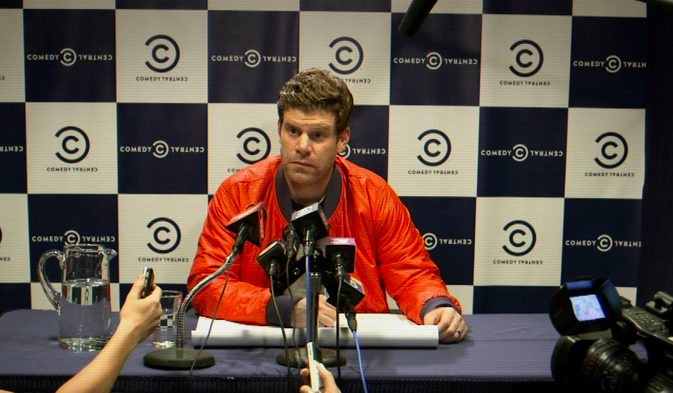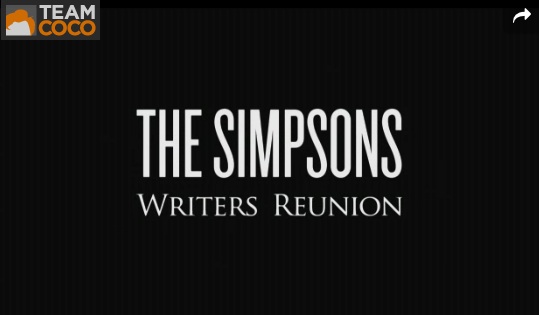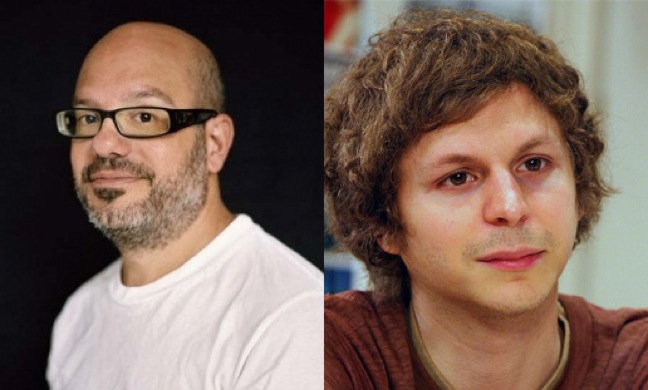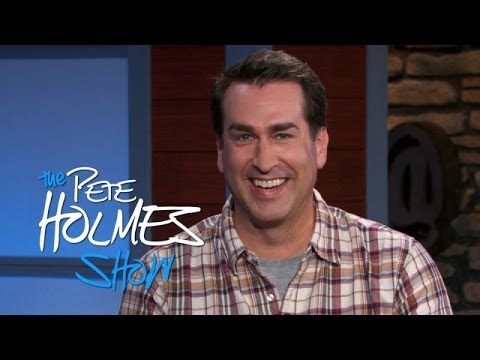I accept Steve Rannazzisi’s apology. Even if he hasn’t yet apologized to me personally. Even if, by the time he last spoke to me in 2013, he’d begun choosing his words a little more carefully when lying about where he was on Sept. 11, 2001.
That he’s coming forward now to make amends, the week his newest stand-up special premieres on Comedy Central, may feel much more important now but won’t in the long run. Whether a New York Times reporter forced his hand, whether it’s a cynical attempt to achieve even more attention, no matter what prompted his admission — what matters most in making amends is how sincere he is and what actions he takes moving forward.
Seeing comedians and friends of his rush forward to dismiss the lie, to defend him despite his own apology, is fascinating to watch. Rannazzisi has apologized. “I don’t know why I said this. This was inexcusable. I am truly, truly sorry.” That’s what he said on Wednesday. Why are you saying his “inexcusable” lies are no big deal? Or a victimless crime? Or deflecting attention by comparing it to bigger lies the Bush Administration sold us after 9/11? Or saying comedians stretch the truth all the time? Or saying he didn’t capitalize on his lies?
Because the truth, no matter how simple it may seem to tell it, is much more complicated than that.
Moving to Los Angeles in the winter of 2001 as an unknown rookie comedian, how do yo become known? How do you stand out from the hundreds of other VHS tapes, headshots and emails to club bookers and casting agents? How do you go from unknown to TV in less than two years?
You look for an angle. You hustle. And maybe in the hustle, you took a shortcut and created a fabulous backstory for yourself, such that no booker, no club owner, no casting agent would ever forget you. The Guy Who Escaped 9/11 and Was Reborn a Comedian.
Rannazzisi had perpetuated his lie for eight years by the time he caught Marc Maron’s attention in Episode 31 of WTF with Marc Maron, just as not only Rannazzisi’s career was taking off with the launch that fall of The League on FX, but also the burgeoning popularity of Maron’s podcast.
What kind of lie are we talking about here, anyhow?
Brian Williams told a similar type of lie repeatedly in TV interviews, putting himself closer to danger of wars in Iraq and elsewhere, reimagining himself in a more heroic fashion. Those lies cost BriWi his job as NBC Nightly News anchor, first via suspension, and now a transfer/demotion to MSNBC.
Perhaps this more resembles the James Frey kind of lie, getting to talk to Oprah and making your memoir a best-selling Oprah pick when your book was filled with false, fictionalized memories. Those falsehoods cost Frey his cool cred with Oprah and a very public reprimand, but it didn’t cost him the money he earned for that novel.
In this manner, Rannazzisi’s lie is closer to the common fabrication you see people making on their resumes about what schools and which degrees they graduated with — which he also lied about, by the way. That kind of lie often costs people their jobs if they’re working in the public eye.
Or like lying on a job application to make yourself sound more appealing than you are, or to disguise the more embarrassing aspects of your past.
Or, since you probably know Rannazzisi best from The League, anyhow, perhaps it’s best to compare this to PEDs in sports. Athletes take steroids and other drugs when they feel they need an edge or advantage over their competition. In Rannazzisi’s case, he needed an advantage over the hundreds of other comedians in Los Angeles seeking fame, fortune and club spots. His drugs were deceptions.
Why do we lie? Most often, it’s fear. Fear that the truth will harm us or someone else, expose us to shame or ridicule, or keep us from winning at life. As if someone is keeping score.
Why do we keep up a lie? Even more shame and fear.
You see this all too often on the campaign trail with politicians who fear losing donors or votes. You see this all too often with police officers and other government officials. Heck, we just saw it this week with the arrest of a Texas teen-ager whose only crime in building a homemade clock for school was that he was a brown-skinned Muslim. The school administrators and law enforcement revealed they had even deeper-rooted fears than if they actually had believed that clock was a bomb. Because they knew it wasn’t. So they lied.
We’re so accustomed to lying in comedy that we shake our heads at it and move on with our lives.
How many comedians lie about their screen credits? As seen on Last Comic Standing, only nobody ever saw them onstage there. Or the more innocuous introduction of “this next act performs in clubs and colleges across the country?” Really now. Even I know, as someone privileged enough to appear as a background extra on two episodes of The Jim Gaffigan Show this summer, that my combined five seconds of face time means anything more than just that (although it’ll remain on my parents’ DVR forever).
Comedy clubs, however, often choose to accept your exaggerated credits as a stand-up for the sake of luring in customers. It’s much easier to draw a crowd for a relatively unknown comedian with TV credits than it is with an ad saying, “Trust us! This comedian will keep you laughing for an hour and becoming a loyal fan for life!” Why do you see actors and actresses from TV taking up valuable comedy club real estate as headliners? Why do you see comedy club barkers in Times Square lying to tourists every day, telling them about that night’s “Comedy Central Showcase”? My heart goes out to the Comedy Central talent scouts who have to visit these clubs every night just to back up those barkers’ promises!
And then there are the comedians who lie by stealing jokes.
We’ve reserved a special place in comedy hell for them, although few of them seem to believe that such a place exists, so The Fat Jewish and Fuck Jerry and the others who steal attention on Twitter and Instagram, which then translates into stealing attention from agents, which translates into stealing money and gigs from the comedians who originally wrote the jokes, that just continues. And there will be people who don’t care about the origins of jokes, and there will be people who defend that practice.
Just as there are people who defend all of the other lies.
*****
Why do we lie?
Ryan Lizza in The New Yorker just this week, writing about Donald Trump’s exaggerated version of reality, cited David Mamet’s 1998 essay, “Three Uses of the Knife,” with this relevant excerpt about how we seem to wish for or demand drama. “It is in our nature to dramatize. We dramatize the weather, the traffic, and other impersonal phenomena by employing exaggeration, ironic juxtaposition, inversion, projection, all the tools the dramatist uses to create, and the psychoanalyst uses to interpret, emotionally significant phenomena.”
Jeff Kreisler, a comedian who works alongside Tony Hendra publishing the satirical website, The Final Edition, wrote an entire book on the subject in 2009: Get Rich Cheating. Kreisler told me today, half-jokingly playing off paragraphs he’d written back then:
“Look, Steve’s in in showbiz. What’s showbiz? Fantasies built upon lies built upon greed built upon desperation built upon alcoholic dads. As anyone in Hollywood their age. I dare you. Then carbon date them. They’re lying. Remember “Beverly Hills 90210,” the show about high schoolers? Average age of the actors: 83.
I’m just surprised Steve didn’t turn his “origin story” it into a book, like Stephen Glass, Jayson Blair, Margaret Seltzer, and James Frey, the guy who made up most of his Oprah-bashed book “A Million Little Pieces.” He was caught, so what? Now he’s spending a million little dollars.
Remember, in cheating, as in life, there’s no such thing as bad publicity. Despicably exploiting 9/11 is pretty close to as bad as it gets – maybe next time he’ll be a pedophile and hipster, too – but still, you’re writing this article on the day his special airs on TV.“
Back in 2010, filming interstitial segments for his appearance on a special called Pauly Shore and Friends, Rannazzisi doubled down on his lie as his wife and baby son sat with him.
*****
Pete Davidson, whose father was a New York City firefighter who died in 9/11 while saving lives, brought the story to the attention of Opie Radio when he was a guest that Wednesday morning at SiriusXM. Opie (Gregg Hughes), Jim Norton and later actor Elijah Wood talked about Rannazzisi’s lie and listened to his 2009 podcast discussion with Marc Maron. Wood noted that it’s a horribly deep lie. Wood also noted the dichotomy: That we live in a social media age where you can make an apology, but that same social media can create a mob mentality where people bring out the pitchforks for you when you make a mistake.
***
On Thursday’s WTF podcast, Maron said that Rannazzisi apologized to him this week as a head’s up before the Times story broke.
“Good for you for owning that,” Maron said he told him.
For his part, Maron thinks this is mostly for Rannazzisi to deal with: “I don’t know that he necessarily owed me an apology, I think it’s the right thing to do to apologize for lying, but I need you guys to know that this is not 60 Minutes. If someone comes on the show and tells a story about their life, I will take what they’re saying at face value. If people come on here and make stuff up, that’s on them. This is obviously going to be a life-changer for Steve, and he’s got to live with this. that’s where that’s at. I appreciate the apology, it was a bad thing to do, but that’s on Steve now, and that’s his cross to bear on his conscience. And he’s got to live with the repercussions with what he did, and now owning up to it.”
****
Buffalo Wild Wings pulled the TV ad campaign he starred in, which since football season just started, is significant financially and symbolically.
Comedy Central pulled the rebroadcast of his 2013 special Manchild which was scheduled to air at midnight Thursday night — interestingly enough, replacing it with his friend Ari Shaffir’s special, Passive Aggressive, and even more interesting of a tangent for comedy fans, that repeat edited out Shaffir’s own offensive misstep (as I suggested).
Comedy Central notified me today that it’s decided to go ahead and air Steve Rannazzisi’s Breaking Dad as planned tonight.
That special includes him owning up to a much smaller lie. “Actually, I wasn’t waking. I was limping, because I was faking an injury. My wife wanted to go pumpkin-picking that weekend, and I’m not doing pumpkin-picking during the NFL season on a fucking Sunday! So I faked the injury! I’m like, ‘Babe, I can’t,'” as he limps across the stage to a round of applause from the crowd at Boston’s Wilbur Theater. His fake injury bridges a commercial break, all in service of him catching his older son trying to really injure his younger son.
This special will live and die on the merits of your laughter. The League ends its run on FX this fall. And then, what’s next will come next.
Making amends is important.
Rannazzisi is making those steps now, and whatever it took for it to happen now, we cannot turn back the clock to make it happen any other way than how it happens now, and hopefully he’ll continue to make amends — support 9/11 survivors, perhaps, be of service to his community however he can see fit. I don’t know if he could or should help any of the comedians he cut in line a decade ago for the prize of TV glory, but he can lend a hand to anyone he sees now who could use the help.
That’s all any of us can hope to do.





One thought on “What we mean when we lie about our comedy”
Comments are closed.